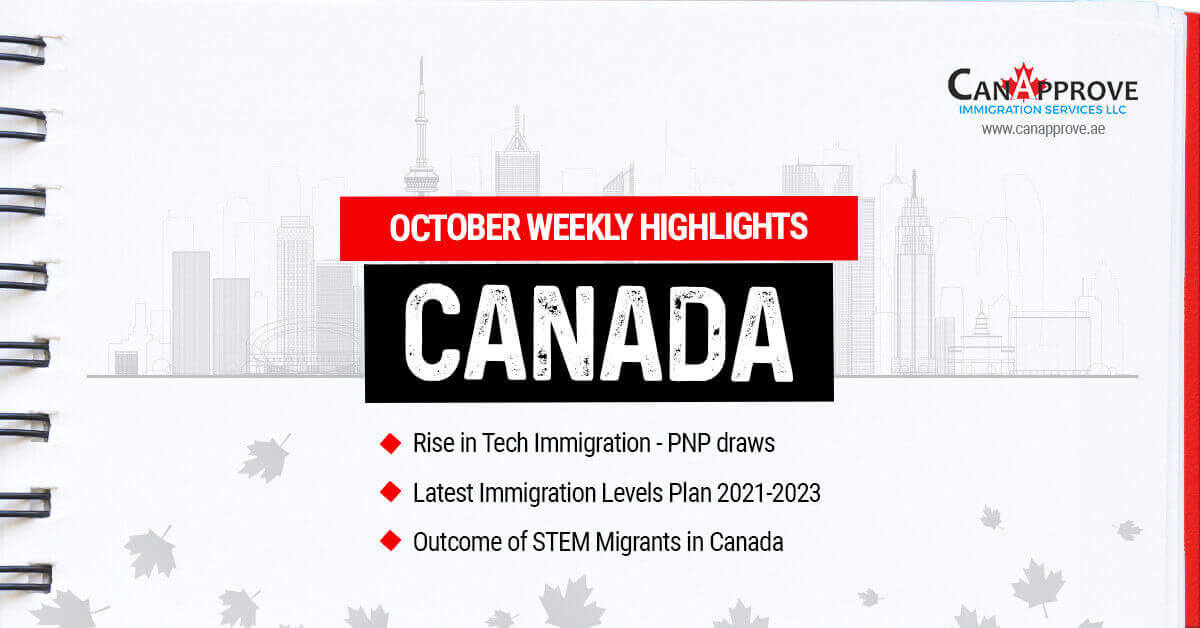October month ended on a historic note for Canada Immigration. It made a few important decisions that would shape the future course of immigration in Canada. Here are some quick highlights from last week’s Immigration scenes in Canada:
Record-breaking Immigration Levels Plan for 2021-2023
New Immigration Levels Plan came at the right time when Immigration in Canada is seen recovering from the aftermath of the pandemic. The newly released plan for 2021-2023 seems to have broken all records in the history of Canada Immigration as it plans to welcome over 1.2 million new immigrants in the next three years.
Any foreign skilled worker without a prior work experience in the country or without a job offer can apply for permanent residence in Canada.
| 2021 | 2022 | 2023 | |
| Projected admissions-Targets | 401,000 | 411,000 | 421,000 |
| Federal economic, provincial/territorial nominees | 208,500 | 213,900 | 217,500 |
| Family Reunification | 105,000 | 105,000 | 106,000 |
Tech Immigration through PNP draws
Canada PNP favoured tech occupations as it targeted near 1.4k candidates to apply for a provincial nomination. A provincial nomination is seen as a guarantee to apply for permanent residence subsequently.
| Saskatchewan | 1,073 candidates under Express Entry and Occupations-in demand categories |
| British Columbia | 354 Express Entry and Skills Immigration categories |
| Ontario | 21 nominations for entrepreneur candidates |
Meanwhile, another Rural and Northern Immigration Pilot from North Bay, community from Ontario went live from October 21. Interested candidates get easy admission into Canada through such rural immigration programs. They are required to demonstrate their human capital strengths like education, age, language proficiency, work experience and skill assessment. They must also determine financial capability above a fixed threshold depending on the size of family immigrating to Canada.
You can fill-in this free online assessment to know your eligibility for various immigration programs in Canada.
Canada Focuses More On French-speaking Immigrants
Canada has recently announced its decision to prioritize the entry of more francophone, or french-speaking populations outside the Quebec region. The country is looking upto 4.4% French-speaking immigrant population outside of Quebec by 2023.
The announcement paves way for any foreign-based skilled worker even without prior work experience in Canada can apply for permanent residence through the Express Entry system. The Immigrants, Refugees, and Citizenship Canada (IRCC) will now award a maximum 25 points for their language skills in French, as against 15 points before. Candidates who are proficient in both English and French can score upto 50 points, up from 30 points before.
Outcomes of STEM migrants in Canada
Statistics Canada released a report noting the economic outcomes of Science, Technology, Engineering, Mathematics (STEM) educated immigrants in Canada.
In terms of occupational outcomes, more than half of STEM-educated immigrant workers held non-STEM jobs. It is not seen as a matter of concern as STEM skills are valued in many other occupations with good economic compensation, say Finance, Accounting, Economics, etc.
The study also found that STEM-educated immigrants that entered Canada through the Canada Experience Class (CEC) program did relatively well compared to others. Any interested candidate is required to have at least one year of skilled work experience in Canada before they could apply to become permanent residents.
Take this free online assessment to determine your eligibility.
If you are planning to immigrate to any foreign country for better employment and social opportunities, Canada should be featuring in your top priority list. We, at CanApprove, are official ICCRC-registered & MARA-registered consultants, supporting interested candidates with all immigration and overseas education-related processes.
Book your free consultation today!














